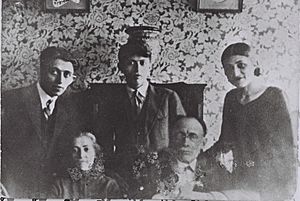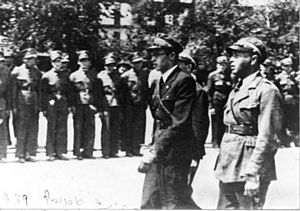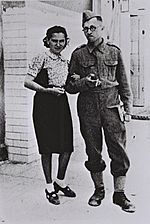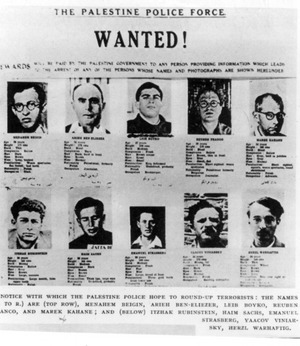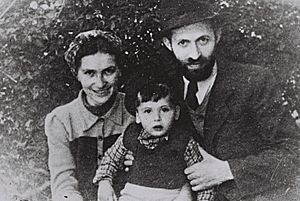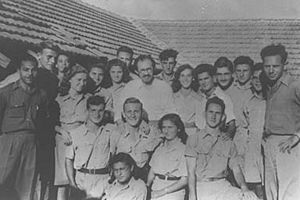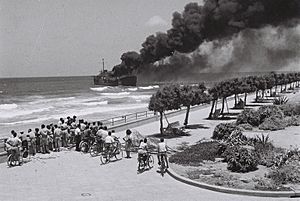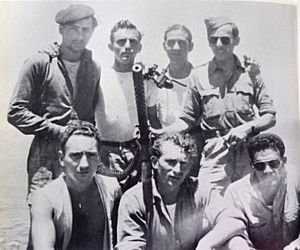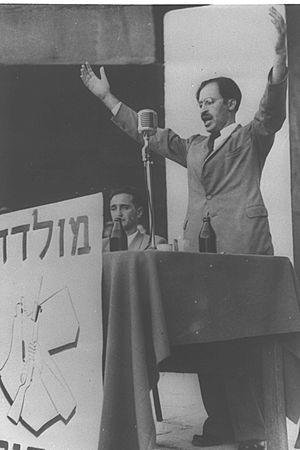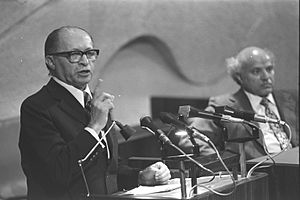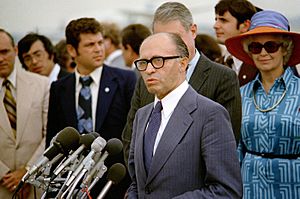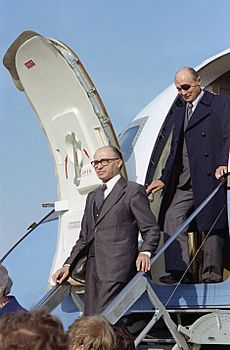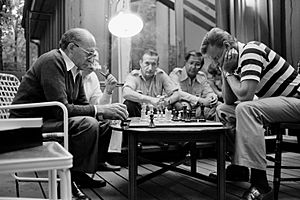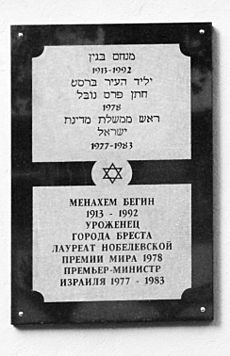Menachem Begin facts for kids
Quick facts for kids
Menachem Begin
|
|
|---|---|
| מנחם בגין | |
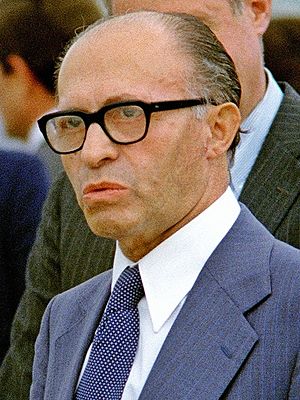
Begin in 1978
|
|
| 6th Prime Minister of Israel | |
| In office 21 June 1977 – 10 October 1983 |
|
| President | Ephraim Katzir Yitzhak Navon Chaim Herzog |
| Preceded by | Yitzhak Rabin |
| Succeeded by | Yitzhak Shamir |
| Ministerial roles | |
| 1967–1970 | Minister in the PM's Office |
| 1980–1981 | Minister of Defense |
| 1983 | Minister of Defense |
| Faction represented in the Knesset | |
| 1948–1965 | Herut |
| 1965–1973 | Gahal |
| 1973–1981 | Likud |
| Personal details | |
| Born | 16 August 1913 Brest, Russian Empire |
| Died | 9 March 1992 (aged 78) Tel Aviv, Israel |
| Spouse |
Aliza Arnold
(m. 1939; died 1982) |
| Children | Ze'ev Binyamin Hasia Leah |
| Alma mater | University of Warsaw |
| Signature |  |
| Military service | |
| Allegiance | |
| Branch/service | |
| Rank | |
| Battles/wars |
|
Menachem Begin (born August 16, 1913 – died March 9, 1992) was an important Israeli politician. He was the founder of the Likud political party and served as the sixth Prime Minister of Israel. Before Israel became a country, he led a group called the Irgun. This group worked to create a Jewish state in Mandatory Palestine, which was then controlled by Britain.
Begin was elected to the first Israeli parliament, called the Knesset. He led the Herut party, which he started. For many years, his party was the main opposition to the ruling Labor Party. In 1977, Begin's party won the election, ending three decades of Labor Party rule.
As Prime Minister, Begin's biggest achievement was signing a peace treaty with Egypt in 1979. For this, he and Egyptian President Anwar Sadat won the Nobel Prize for Peace. His government also built more Israeli settlements in the West Bank and Gaza Strip. Begin ordered the bombing of a nuclear plant in Iraq and sent Israeli forces into Lebanon in 1982. He resigned in 1983 after his wife died and the war in Lebanon became very difficult.
Contents
Menachem Begin: Early Life and Political Journey
Menachem Begin was born in 1913 in Brest-Litovsk, which was then part of the Russian Empire and is now in Belarus. He was the youngest of three children. His father was a timber merchant and a strong supporter of Zionism, the movement to create a Jewish homeland.
As a child, Begin went to a religious Jewish school. Like many Jewish children in his town, he was part of a Zionist scout group called Hashomer Hatzair. When he was 16, he joined Betar, another Zionist youth movement. He also attended a Polish government school, where he learned about classical literature.
Begin studied law at the University of Warsaw. Here, he developed strong speaking skills that became famous later in his political career. He also organized a group of Jewish students to protect themselves from anti-Jewish attacks on campus. He finished his studies in 1935 but never worked as a lawyer.
Joining the Betar Movement
During this time, Begin became a follower of Ze'ev Jabotinsky, who started the Revisionist Zionism movement. This movement believed in a strong Jewish state. Begin quickly rose through the ranks of Betar. By age 22, he was speaking alongside Jabotinsky at major meetings. In 1937, he became the head of Betar in Poland, which was the largest branch.
While traveling for Betar, he met Aliza Arnold, who became his wife in 1939. They had three children: Binyamin, Leah, and Hassia. Begin worked to help Polish Jews move to Palestine. In 1939, he tried to help 1,500 Jews get into Romania, but it was unsuccessful.
World War II and Imprisonment
In September 1939, when Germany invaded Poland, Begin escaped to Wilno (now Vilnius). This city was soon taken over by the Soviet Union. Because he was a well-known Zionist, Soviet police arrested Begin in 1940. He was accused of being a "British agent" and sentenced to eight years in Soviet labor camps, known as the gulag. He was sent to a camp in northern Russia and stayed there until May 1942. Begin later wrote a book about his experiences called White Nights.
In July 1941, after Germany attacked the Soviet Union, Begin was released because he was a Polish citizen. He then joined the Free Polish Anders' Army. He was sent with the army to Palestine, arriving in May 1942.
Joining the Irgun
Once in Palestine, Begin decided to leave the Polish army. He chose to stay and fight for a Jewish state. In December 1942, he joined the Irgun, a Jewish underground group.
Leading the Jewish Underground
In 1944, Menachem Begin became the leader of the Irgun. His goal was to make the British government remove its troops from Palestine. On February 1, 1944, the Irgun declared a revolt against British rule. They began bombing British offices in Jerusalem, Tel Aviv, and Haifa.
The Irgun and another group called Lehi increased their attacks throughout 1944. These operations were funded by asking Jewish merchants for money and through insurance scams.
In 1945, it became clear that Britain would not create a Jewish state or allow many Jews to immigrate. After the British arrested many Jews and seized weapons, Begin ordered an attack on the British military headquarters at the King David Hotel.
In September 1947, the British government decided to leave Palestine. In November, the United Nations voted to divide the land between Arabs and Jews. The cost of fighting the Jewish groups and public opposition in Britain were big reasons for this decision.
The Altalena Incident
After Israel declared independence on May 14, 1948, the Irgun continued to fight alongside other Jewish groups. On June 1, 1948, Begin agreed to combine the Irgun with the new Israel Defense Forces (IDF). However, a ship called the Altalena was bringing weapons for the Irgun. This ship arrived during a ceasefire ordered by the United Nations.
The new Israeli government, led by David Ben-Gurion, wanted all weapons to go to the IDF. Begin wanted some weapons for Irgun fighters in Jerusalem. When the Altalena arrived, the government ordered the IDF to take the ship by force. Fighting broke out, and the ship was shelled and caught fire. Begin, who was on board, only left after the wounded were evacuated.
More than 200 Irgun fighters were arrested, but most were later released. Begin agreed that Irgun soldiers would fully join the IDF. The Altalena was later sunk at sea. This event caused a deep disagreement between Begin and Ben-Gurion.
Menachem Begin: A Political Leader
Forming the Herut Party
In August 1948, Begin and other Irgun leaders formed a new political party called Herut ("Freedom"). This party was a successor to the Revisionist Zionist movement. Herut is seen as the early version of today's Likud party.
In the first Israeli elections in 1949, Herut won 14 seats in the Knesset. This made Begin a legitimate leader of the Revisionist Zionist movement. For many years, Herut and its later alliances were the main opposition to the ruling Labor Party.
Begin was a strong critic of the Labor Party. He often wore a formal suit and tie, which was different from the more casual style of the Labor leaders. This helped show the differences between their political ideas.
Leading the Likud Party
In 1973, Begin helped create a larger group of opposition parties called the Likud ("Consolidation"). This group included Herut and other smaller parties. In the elections that year, Likud won many votes, but still remained in opposition.
After the Yom Kippur War in 1973, many people were unhappy with the government. Begin's message appealed to many Mizrahi Jews, who felt they were treated as second-class citizens by the ruling party. Begin's open support for Jewish traditions also attracted voters who felt distant from the Labor Party's secular views. This growing support helped Likud become a major force in Israeli politics.
Becoming Prime Minister
On May 17, 1977, the Likud party, led by Begin, won the Knesset elections by a large margin. This was a huge change in Israeli politics, as it was the first time a party other than the Labor Party was able to form a government. This event is known as the Mahapakh ("upheaval").
Likud's victory showed a shift in Israeli society. It brought together groups who felt left out by the older, socialist leaders. Begin's campaign focused on his personality, presenting himself as a humble and religious leader. Many working-class and Mizrahi communities strongly supported Likud.
With 43 seats, Likud needed other parties to form a government. Begin formed a coalition with smaller religious parties. He also invited Moshe Dayan, a well-known politician from the old establishment, to be Foreign Minister. This helped his government gain wider support. On June 21, 1977, Begin officially became the new Prime Minister of Israel.
Changes in Israel
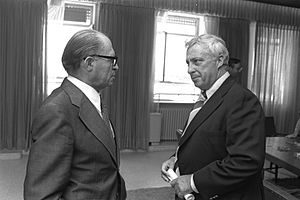
As Prime Minister, Begin made several changes in Israel. He removed tuition fees for high school and extended compulsory education. New social programs were introduced, like long-term care insurance. A ban on color television was also removed.
Begin wanted to make Israel's economy more free-market oriented, moving away from its socialist past. He lowered customs duties to encourage more imports. However, these changes also led to a rise in prices and inflation. Despite this, Begin's government started a trend towards a more capitalist economy in Israel.
Making Peace with Egypt
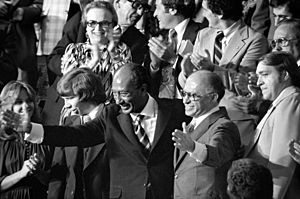
In 1978, Begin, along with his Foreign Minister Moshe Dayan and Defense Minister Ezer Weizman, went to Camp David in the United States. There, they negotiated the Camp David Accords with Egyptian President Anwar Sadat. This led to the 1979 Egypt–Israel peace treaty.
Under this treaty, Israel agreed to return the entire Sinai Peninsula to Egypt. This peace treaty was a huge moment in Middle Eastern history. It was the first time an Arab country recognized Israel's right to exist. For this historic achievement, Begin and Sadat were awarded the Nobel Peace Prize in 1978.
This peace treaty changed Begin's image from a radical nationalist to a respected statesman. However, some members of his own Likud party criticized the treaty. They found it hard to accept giving up land, which went against their belief in a "Greater Israel." Despite these disagreements, the treaty was approved by a large majority in the Knesset.
Begin was less willing to agree to Palestinian self-rule in the West Bank and Gaza Strip. Instead, he appointed Ariel Sharon to expand Jewish settlements in these areas. This policy aimed to make it harder to give up these territories in the future. Many new settlements were built, and the Jewish population in the West Bank and Gaza grew significantly during his term.
Important Decisions as Prime Minister
Bombing the Iraqi Nuclear Reactor
Begin took threats from Iraqi President Saddam Hussein very seriously. Iraq was building a nuclear reactor with help from France and Italy. Begin believed this reactor could be used to create nuclear weapons against Israel.
After diplomatic efforts failed, Begin decided to destroy the reactor. In June 1981, he ordered the Israeli Air Force to bomb the reactor in an operation called Operation Opera. This mission was successful. After the attack, Begin stated the "Begin Doctrine": Israel would not allow any enemy to develop weapons of mass destruction against it. Many countries, including the United States, criticized the operation.
The Lebanon War
On June 6, 1982, Begin's government authorized the Israel Defense Forces to invade Lebanon. This was in response to an attempt to assassinate Israel's ambassador to the United Kingdom. The goal of the operation, called Peace for Galilee, was to push the PLO (Palestine Liberation Organization) out of rocket range from Israel's northern border.
Begin hoped for a short war that would destroy the PLO's power in southern Lebanon. However, the fighting grew into a larger war involving Palestinian and Lebanese groups, as well as the Syrian army. Israeli forces advanced all the way to Beirut, the capital of Lebanon. The war succeeded in driving the PLO out of Lebanon, but it did not bring lasting security to Israel's northern border or stability to Lebanon.
Sabra and Shatila Massacre
Public dissatisfaction in Israel grew after the Sabra and Shatila Massacre in September 1982. This was a killing of many Palestinian refugees by Christian Phalangist militia allies of the Israelis. Hundreds of thousands of people protested in Tel Aviv. An investigation, called the Kahan Commission, found the Israeli government indirectly responsible. It recommended that Defense Minister Ariel Sharon be removed from office. Sharon eventually resigned as Defense Minister.
Begin's health and mood were affected by the war. He seemed out of touch with the details of the military campaign. Some reports later suggested that Sharon might have misled Begin about the war's true goals.
Resignation and Later Life
After his wife Aliza died in November 1982, Begin fell into a deep sadness. He was also disappointed that the war in Lebanon did not lead to a peace treaty with Lebanon. In October 1983, he resigned from office, telling his colleagues, "I cannot go on any longer." He handed over the role of Prime Minister to Yitzhak Shamir.
Begin then retired from public life and lived in seclusion in an apartment in Jerusalem. He rarely left his home, except to visit his wife's grave. He spent most of his days reading and watching movies. He also kept up with world news by listening to the BBC and reading newspapers.
In 1990, Begin broke his hip and had surgery. His health improved somewhat, and he moved to an apartment in Tel Aviv. He gave a few telephone interviews in 1991, which were his last.
Death
On March 3, 1992, Begin suffered a severe heart attack and was taken to the hospital. He was unconscious and paralyzed on one side of his body. Despite some improvement, his condition worsened, and he died on March 9, 1992, at the age of 78.
Begin's funeral took place in Jerusalem that afternoon. Thousands of people attended. He had asked for a simple Jewish burial, not a state funeral. He was buried on the Mount of Olives next to his wife Aliza, rather than at Mount Herzl where most Israeli leaders are buried. About 75,000 mourners were present at the funeral.
Overview of Offices Held
Menachem Begin served as the Prime Minister of Israel from June 21, 1977, to October 10, 1983.
He was a member of the Knesset (Israel's parliament) from 1949 until his resignation in 1983. He also served as the opposition leader twice: from 1955 to 1967, and again from 1970 to 1977.
Begin was the founding leader of the Herut party and later the Likud coalition, leading both until 1983.
Ministerial Posts
| Ministerial post | Tenure | Prime Minister(s) | Government(s) | Predecessor | Successor |
|---|---|---|---|---|---|
| Minister without portfolio | 5 June 1967–10 March 1975 | Levi Eshkoluntil 26 February 1969 Yigal Allon (acting 26 February 1969–17 March 1969) Golda Meir (from 17 March 1969) |
13, 14, 15 | N/A | N/A |
| Minister of Communications | 21 June 1977–24 October 1977 | Menachem Begin | 18 | Aharon Uzan | Meir Amit |
| Minister of Justice | 21 June 1977–24 October 1977 | Menachem Begin | 18 | Moshe Baram | Yisrael Katz |
| Minister of Labour and Social Welfare | 21 June 1977–24 October 1977 | Menachem Begin | 18 | Haim Yosef Zadok | Shmuel Tamir |
| Minister of Transportation | 21 June 1977–24 October 1977 | Menachem Begin | 18 | Gad Yaacobi | Meir Amit |
| Minister of Foreign Affairs | 23 October 1979–10 March 1980 | Menachem Begin | 18 | Moshe Dayan | Yitzhak Shamir |
| Minister of Defense | 28 May 1980–5 August 1981 | Menachem Begin | 18, 19 | Ezer Weizman | Ariel Sharon |
| Minister of Agriculture | 19 June 1983–10 October, 1983 | Menachem Begin | 19 | Simha Erlich | Pesah Grupper |
See also
 In Spanish: Menájem Beguín para niños
In Spanish: Menájem Beguín para niños
 | Janet Taylor Pickett |
 | Synthia Saint James |
 | Howardena Pindell |
 | Faith Ringgold |


